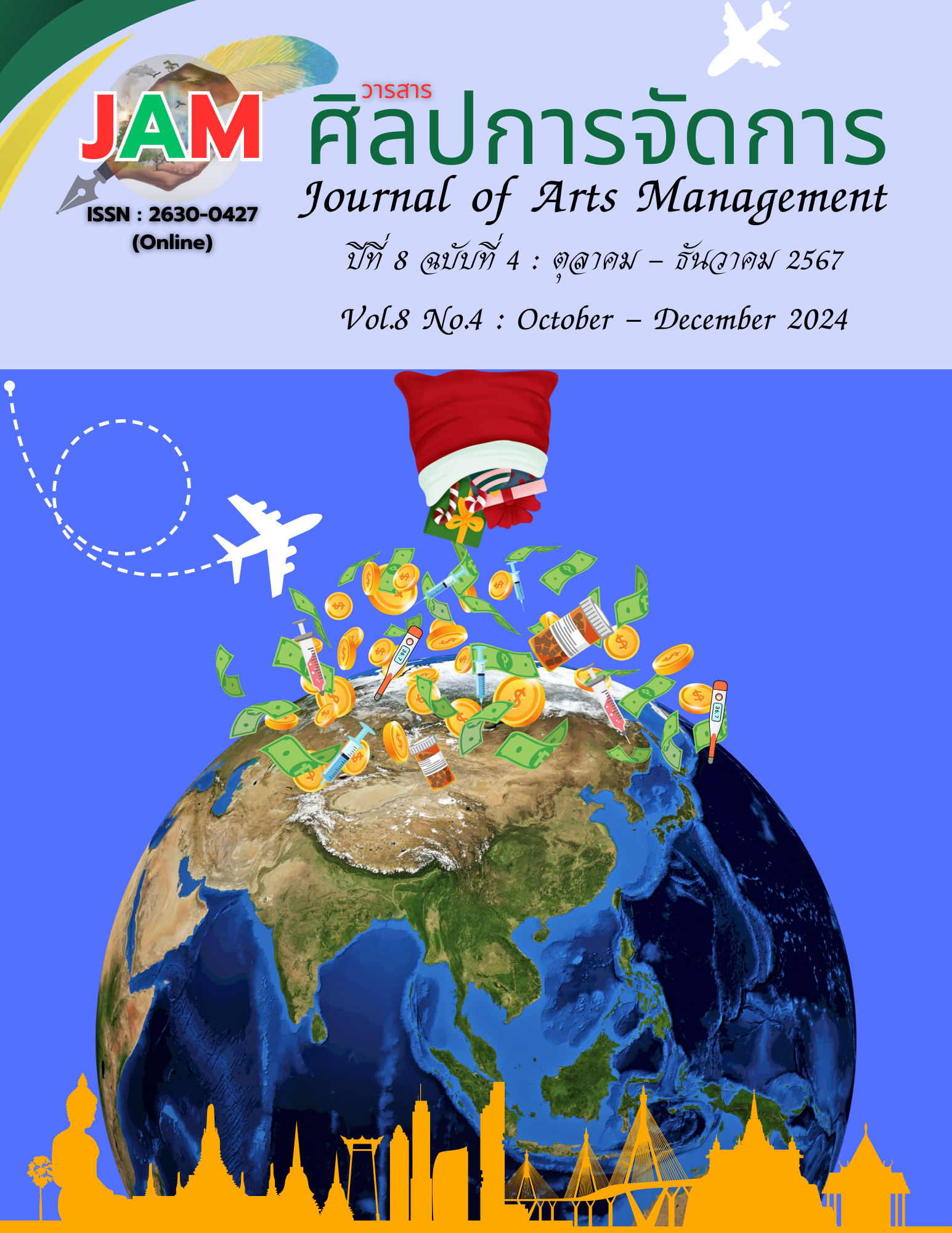การจัดการการท่องเที่ยวเชิงสัมผัสวิถีชีวิตเกษตรของชุมชนต้นแบบในกลุ่มจังหวัดภาคตะวันออกเฉียงเหนือตอนกลาง
Main Article Content
บทคัดย่อ
บทความวิจัยนี้มีวัตถุประสงค์เพื่อศึกษา 1) การมีส่วนร่วมของชุมชนในการจัดการการท่องเที่ยวเชิงเกษตรโดยชุมชน 2) ความคิดเห็นของนักท่องเที่ยวที่มีต่อการท่องเที่ยวเชิงสัมผัสวิถีชีวิตเกษตรของชุมชนต้นแบบ และ 3) รูปแบบการจัดการการท่องเที่ยวเชิงสัมผัสวิถีชีวิตเกษตรของชุมชนต้นแบบในกลุ่มจังหวัดภาคตะวันออกเฉียงเหนือตอนกลาง เป็นการวิจัยเชิงสำรวจแบบผสานวิธีด้วยการวิจัยเชิงคุณภาพและเชิงปริมาณ ประชากรและกลุ่มตัวอย่างแบบเจาะจง มีเครื่องมือ 3 แบบ ได้แก่ 1) แบบสัมภาษณ์เชิงลึกใช้กับผู้นำชุมชนและเจ้าหน้าที่รัฐ 33 คน 2) การประชุมกลุ่มย่อยใช้กับผู้นำชุมชนและตัวแทนของกลุ่มอาชีพ 8 – 15 คน จำนวน 3 ครั้ง 3) แบบสอบถามปลายปิดใช้กับนักท่องเที่ยวชาวไทย จำนวน 400 คน วิเคราะห์ข้อมูลด้วยสถิติเชิงพรรณนา สถิติทดสอบ Chi-Square และ Kruskal-Wallis Test ผลการศึกษาพบว่า 1) ชุมชนต้นแบบ 4 หมู่บ้าน ชาวบ้านต่างมีส่วนร่วมในการจัดการการท่องเที่ยวเชิงเกษตร 4 ด้าน ได้แก่ ร่วมตัดสินใจ ร่วมปฏิบัติการและดำเนินกิจกรรม ร่วมรับผลประโยชน์ และร่วมการประเมินผล 2) ความคิดเห็นของนักท่องเที่ยวที่มีต่อการท่องเที่ยวเชิงสัมผัสวิถีชีวิตเกษตร มี 3 ด้าน ได้แก่ ด้านกิจกรรมการท่องเที่ยวเชิงเกษตร ด้านการให้บริการการท่องเที่ยวเชิงเกษตร และด้านการจัดการการท่องเที่ยวเชิงเกษตรโดยชุมชน 3) รูปแบบการจัดการการท่องเที่ยวเชิงสัมผัสวิถีชีวิตเกษตรของพื้นที่กลุ่มจังหวัดภาคตะวันออกเฉียงเหนือตอนกลาง จากการวิเคราะห์ความสัมพันธ์และสังเคราะห์ร่วมกับผู้ที่เกี่ยวข้องกับการท่องเที่ยวเชิงเกษตรทั้ง 4 หมู่บ้าน พบว่ามีองค์ประกอบสำคัญ 6 ด้าน ได้แก่ การจัดการการท่องเที่ยวเชิงเกษตร (Management) องค์กรชุมชน (Organization) ทรัพยากรธรรมชาติและวัฒนธรรม (Recourses) กิจกรรมท่องเที่ยวเชิงเกษตร (Activities) การเรียนรู้ของนักท่องเที่ยว (Learning) และการให้บริการ (Service) หรือ “MORALS Model”
Article Details

อนุญาตภายใต้เงื่อนไข Creative Commons Attribution-NonCommercial-NoDerivatives 4.0 International License.
ทัศนะและความคิดเห็นที่ปรากฏในบทความในวารสารศิลปการจัดการ ถือเป็นความรับผิดชอบของผู้เขียนบทความนั้น และไม่ถือเป็นทัศนะและความรับผิดชอบของกองบรรณาธิการ ยินยอมว่าบทความเป็นลิขสิทธิ์ของวารสารศิลปการจัดการ
เอกสารอ้างอิง
Belliggiano, A. et al. (2020). The eco-effectiveness of agritourism dynamics in Italy and Spain: A tool for evaluating regional sustainability. Sustainability, 12(7080), 1-25.
Chantabut, N. et al. (2020). Management of agricultural tourism formats by touching farmer lifestyle in organic farming communities in Mahasarakham Province. Office of the Science Promotion Commission Research and Innovation (NRCT), Research for Local Affairs Division.
Department of Agricultural Extension. (2022, May 15). The department of agricultural extension promotes agricultural tourism in response to government policy to create jobs and income for farmers. https://www.thailandplus.tv/archives/106941
Department of Community Development. (2019). Developing villages with a sufficiency economy to create happiness for the community. Community Strengthening Office.
Donkwa, K., & Tikul, J. (2014). The quality development of agro-tourism in the Northeast Thailand. Suranaree Journal of Social Science, 8(1), 55-71.
Ekakul, T. (2001). Research methods in behavioral science and social science (2nd ed.). Wittaya.
Kaewyod, Y. (2014). The study of community participation in agro-tourism development in Wang Nam Khiao sufficiency economy settlement, Nakhon Ratchasima. Agricultural Cooperative Assembly of Thailand Printing Company Limited.
Khampuanbutra, W., & Phakprapai, C. (2024). A model for agri-tourism of the model community in Ban Hua Khua, Kae Dam District, Maha Sarakham Province. Journal of Social Science and Cultural, 8(1), 26-40.
Krzeski, S. (2005). Promotion in agro-tourist companies in the region of Warmia and Mazury in Poland. http://www.du.se/PageFiles/5052/Krzeski%20Szymon.pdf
Lakbanchong, T. (2019). The development of participation model in sustainable agritourism management of Na Muen Si Community, Na Yong District, Trang Province. Rajamangala University of Technology Srivijaya.
Mahawongsanan, B. (2017). Guidelines for developing high agritourism Baan Santisuk - Baan Khun Klang, Phayao Province[Master’s thesis, University of Phayao].
Mid North-Eastern Provincial Cluster. (2022, April 28). Central Northeastern Province Group Development Plan (2023-2027). http://www.osmnortheast-c.moi.go.th/planosm 66-70
Ministry of Tourism and Sports. (2010). Manual for evaluating quality standards of agricultural tourism destinations. Tourist Attraction Development Office.
Ministry of Tourism and Sports. (2022, May 15). Ministry of Tourism Joining forces with the Ministry of Agriculture to integrate agricultural tourism. https://www.mots.go.th/News-view.php?nid=6882
Munpao, P. (2016). Agrotourism decision making behavior: A case study of Mahasawat Canal in Nakhon Pathom Province. Journal of Thonburi University, 10(22), 104-110.
Na Songkhla, T. (2011). Relationship between forms of Agro-tourism activities and usage of local agricultural resources: A case study of
Changklang Agro-tourism, Nakhon Si Thammarat Province. Journal of Business, Innovation and Sustainability, 6(2), 1-11.
Na Songkhla, T. (2013). Model of agricultural resources management for sustainable Agro-tourism in Changklang District, Nakhon Si Tammarat Province[Doctoral dissertation, Prince of Songkla University].
Naiyapatana, O. (2008). Quantitative and qualitative research methodologies in social science (3rd ed.). Samlada.
Office of Chonnabot District Community Development. (2018, October 19). Sufficiency economy village model community. http://district.cdd.go.th/chonnabot/SufficiencyEconomyVillage
Office of Kaset Wisai District Community Development. (2022, May 15). News: "The team at Kaset Wisai is more than 100. Follow up/support the model Sufficiency Economy Village, Ban Phon Had, Dong Khrang Noi Subdistrict." https://district.cdd.go.th/kasetwisai/2019/12/13
Phusi-on, S. (2011). Application of SPSS to analyze research data. Statistical package for the social sciences (4th ed.). Mahasarakham University.
Pothisita, C. (2013). The science and art of qualitative research (6th ed.). Amarin.
Saengphikul, A. (2013). Research methodology for tourism and hospitality. Dhurakij Pundit University.
Sarobon, S. et al. (2002). Community Base-tourism: Concepts and experiences. Ming Muang Nawarat.
Sarobon, S. et al. (2003). Community Base-tourism: Concepts and experiences of the northern region. Wanida Press.
Simon, H. A. (1957). Models of man, social and rational: Mathematical essays on rational human behavior in society setting. Wiley.
Sributta, C. (2011). People participation in homestay cultural tourism. Ban Khok Kong, Tambon Kut Wa, Amphoe Kuchinarai, Changwat
Kalasin[Master’s thesis, Kasetsart University].
Srithong, S. (2016). The development of a community-based agrotourism management model[Doctoral dissertation, Chulalongkorn University].
Suansri, P. (2003). Community based tourism handbook. Tourism for Life and Nature Project.
Suvarnakuta, K. et al. (2015). Tourism management models for increasing the income in the Agricultural sector in Rayong province. The Thailand Research Fund (TRF).
Thammabutra, P. (2006). Teaching publications of tourism strategic planning. Tourism Development Institute to Preserve the Environment, Srinakharinwirot University.
Tungprasert, S. (2011). The agro-tourism sustainable management at Nakhon Ratchasima province based on sufficiency economy philosophy. The Journal of the Royal lnstitute of Thailand, 36(4), 607-628.
Wannapho, P. (2016). Public participation in agri-tourism management: A case study of Ban Sai En community, Village Number 8, Song Salueng Subdistrict, Amphoe Klaeng, Rayong Province[Master’s thesis, Burapha University].
Wongkoon, S. (2007). Potential for cultural tourism management of Trakan Phuetphon Municipality. Trakan Phuet Phon District, Ubon Ratchathani Province[Master’s thesis, Khon Kaen University].


